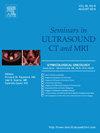Essential Point-of-Care Ultrasound Insights for 2024
IF 1.9
4区 医学
Q3 RADIOLOGY, NUCLEAR MEDICINE & MEDICAL IMAGING
引用次数: 0
Abstract
To assess point-of-care ultrasound (POCUS) in 2024, we should start by defining its expanded scope and integration into general and specialty practice. Clinicians should abide by the evolving evidence for POCUS utilization and patient outcomes different from mortality and morbidity, especially as there are notable advancements in handheld ultrasound technology with a clear shift from capability to portability. To reduce diagnostic errors, POCUS practitioners need a holistic framework that accounts for known and new applications. Defining the POCUS scope of practices, proper training, and innovation, like artificial intelligence, can play a bigger role in mitigating diagnostic errors as we move forward.
2024 年 POCUS 重要洞察
要评估 2024 年的 POCUS,我们应首先确定其扩大的范围,并将其纳入普通和专科实践。临床医生应遵守不断发展的证据,了解 POCUS 的使用情况以及不同于死亡率和发病率的患者预后,尤其是在手持式超声技术取得显著进步,明显从功能性向便携性转变的情况下。为了减少诊断错误,POCUS 从业人员需要一个考虑到已知应用和新应用的整体框架。明确 POCUS 的操作范围、适当的培训和创新(如人工智能)可以在减少诊断错误方面发挥更大的作用。
本文章由计算机程序翻译,如有差异,请以英文原文为准。
求助全文
约1分钟内获得全文
求助全文
来源期刊
CiteScore
2.60
自引率
0.00%
发文量
49
审稿时长
6-12 weeks
期刊介绍:
Seminars in Ultrasound, CT and MRI is directed to all physicians involved in the performance and interpretation of ultrasound, computed tomography, and magnetic resonance imaging procedures. It is a timely source for the publication of new concepts and research findings directly applicable to day-to-day clinical practice. The articles describe the performance of various procedures together with the authors'' approach to problems of interpretation.

 求助内容:
求助内容: 应助结果提醒方式:
应助结果提醒方式:


